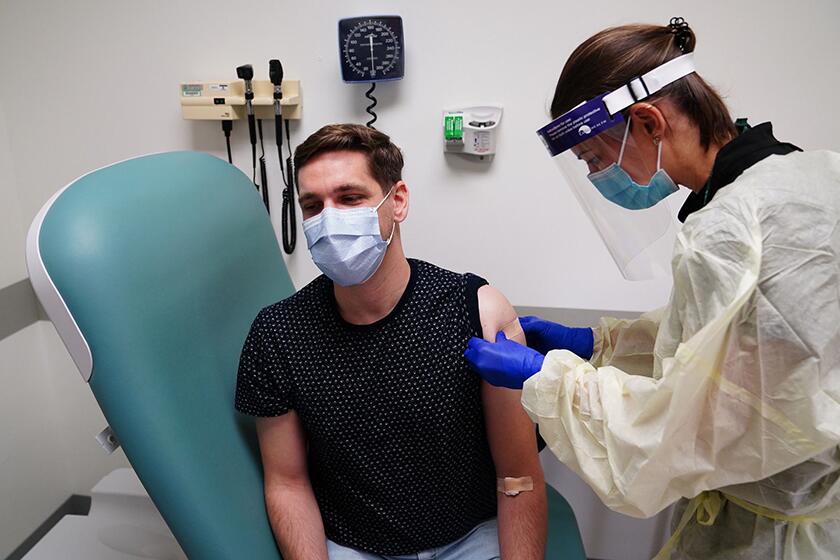No results? No research money.
- Share via
The search for an AIDS vaccine has lost its scientific purpose and turned into a self-serving quest.
How else to explain the remarks found in David Baltimore and Seth Berkley’s “Keep funding the AIDS vaccine”? Saying simply that “AIDS vaccine development is hard” is not a credible response to recent criticism leveled at the ballooning U.S. budget for AIDS vaccine research and the meager results it has produced. The argument is particularly weak when you consider that nearly $1 billion in public funding is poured annually into this fruitless quest, while millions globally lack access to the revolutionary, life-saving AIDS treatment that was developed more than 12 years ago: antiretroviral medication.
The recent Merck vaccine trial that Baltimore and Berkley mention was not only a failure, it actually endangered lives by increasing the likelihood that study participants would contract the virus. The Merck trial was also not an anomaly. There have been 25 years of repeated AIDS vaccine failures at high cost to taxpayers. To call for more human clinical research -- as Baltimore and Berkley do -- defies common sense and endangers lives. Important insights into the basic mechanisms of the virus and the human body’s response to it are still missing. So where is the science to back up their call for more money? And can such an expense be justified if measured in human lives lost because of lack of access to treatment that can cost as little as 50 cents a day?
The best way to break the chain of infection is to prevent an infected person from passing it on to others. A number of extraordinarily effective approaches to achieve this already exist. The spread of infection would be significantly curbed if we focused primarily on the source of all new infections: the 33 million people who are currently estimated to be carrying the virus. Effective pre- and/or post-exposure prophylaxis treatments are an example of a possible approach. A focused antiretroviral pre-prophylaxis effort in high-risk populations, such as commercial sex workers, would be a highly cost-effective way to prevent the spread of infection.
There is also mounting evidence to demonstrate that patients with undetectable viral loads -- achieved through antiretroviral treatment -- have a much lower rate of transmission, perhaps a rate even lower than could be achieved with a successful vaccine. Still, these lifesaving drugs are currently unavailable to all but the smallest fraction of the people who need them. What might a nearly $1-billion annual investment in the worldwide scale-up of antiretroviral treatment buy in terms of transmissions prevented?
In a post-Merck-failure research climate, the scientific community has come to a consensus: an investment in basic science is needed. Such research does not require the enormous, and enormously expensive, global clinical trial apparatus currently in place for AIDS vaccine research. In fact, according to recent reports, researchers with Berkley’s International AIDS Vaccine Initiative and the Center for HIV/AIDS Vaccine Immunology -- employing funds from the U.S. HIV vaccine research pot -- plan to focus on such areas of basic science research as the genetic sequencing of new HIV viruses, an investigation into how genetic factors might control HIV infection and inquiry into the possible reasons why some people exposed to HIV do not progress to AIDS. However, the U.S. government already allocates several billion dollars a year to funding basic AIDS research. So what is the purpose of setting aside another $1 billion annually under a separate HIV vaccine research umbrella?
To date, there has been no evidence that there will ever be an AIDS vaccine. In fact, in a poll of more than 35 top HIV/AIDS scientists in Britain and the U.S. conducted by Britain’s Independent newspaper and published this week, “nearly two-thirds believed that an HIV vaccine will not be developed within the next 10 years” and a “substantial minority of the scientists admitted that an HIV vaccine may never be developed.”
Resources are not limitless. To date, there has been no evidence that there will ever be an AIDS vaccine. It is time for an honest reassessment of funding priorities and a redeployment of resources into delivering antiretroviral medications to the people who need it. It is time to pull the plug on U.S. public funding for HIV vaccine research.
After all, can you think of any other U.S. enterprise that has been studied and investigated for 25 years and on which many billions of dollars have been spent without any results?
Homayoon Khanlou, MD, is chief of medicine, U.S., and Michael Weinstein is president of the AIDS Healthcare Foundation.
Blowback is an online forum for full-length responses to our articles, editorials and Op-Eds. Click here to read more about Blowback, or submit your own by e-mailing us at opinionla@latimes.com.
More to Read
A cure for the common opinion
Get thought-provoking perspectives with our weekly newsletter.
You may occasionally receive promotional content from the Los Angeles Times.









